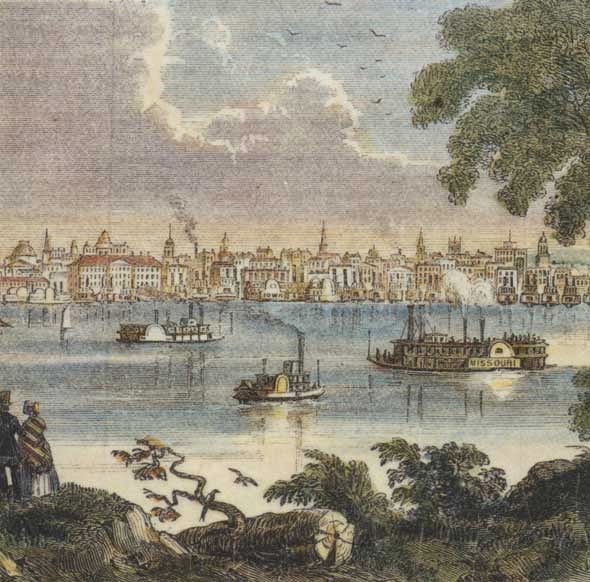Lynn and I are currently reading together Truth Will Prevail, the Rise of the Church of Jesus Christ of Latter-day Saints in the British Isles 1837-1987 edited by V. Ben Bloxham, James R. Moss and Larry C. Porter. The book marked the 150th anniversary of the Church in Great Britain in 1837 when Heber C. Kimball, Lynn's third great grandfather, and six other missionaries (including Apostle Orson Hyde (who maried my grandfather's sister, Mary Ann Price in Nauvoo) came to Liverpool and then to Preston and other areas around this region. Three years later, in 1840, Heber C. Kimball returned with seven other apostles including Brigham Young, John Taylor, Wilford Woodruff, Orson Hyde and Parley P. Pratt.
The first chapter starts in Canada and is entitled Beginnings of the Restoration: Canada, an "Effectual Door" to the British Isles. As mentioned in this chapter:
"These early conversions [in Canada] played an important role in the gospel being taken to Great Britain in June-July 1837. Most Canadians who joined the Church in this formative period were either born in Britain or descended from British ancestors, and many still maintained contact with their relations across the sea. Such associations were indispensable to the success of the Church's proselytizing efforts in Britain, and the Spirit of the Lord carefully directed these preliminary steps.
"An example of this fact is an event in the life of Elder Parley P. Pratt. Back in Kirtland, [Ohio] one night in early April 1836, Elder Pratt and his wife Thankful had retired for the evening when a knock at the door surprised them. Parley arose and opened the door to his fellow apostle Heber C. Kimball and some others who had come to call. Being filled with a prophetic spirit, Elder Kimball blessed both Parley and Thankful, and gave a moving prophecy of singular importance to that household:
"Brother Parley, thy wife shall be healed from this hour, and shall bear a son [ten years of marriage had produced no offspring], and his name shall be Parley; and he shall be a chosen instrument in the hands of the Lord to inherit the priesthood and to walk in the steps of his father. He shall do a great work in the earh in ministering the Word and teaching the children of men. Arise, therefore, and go forth in the ministry, nothing doubting. Take no thoughts for your debts, nor the necessaries of life, for the Lord will supply you with abundant means for all things."
"Continuing his prophetic utterances, the gifted elder next pronounced a prediction of monumental significance to the greater Church:
"Thou shalt go to Upper Canada, even to the city of Toronto, the capital, and there thou shalt find a people prepared for the fulness of the gospel, and they shall receive thee, and thou shalt organize the Church among them, and it shall spread thence into the regions round about, and many shall be brought to the knowledge of the truth and shall be filled with joy; and from things growing out of this mission, shall the fulness of the gospel spread into England, and cause a great work to be done in that land."
Among Parley's converts on that mission to Canada were President John Taylor, Joseph Fielding, and his sister Mary Fielding (who becomes the wife of Hyrum Smith and the mother of President Joseph F. Smith). Apostle Heber C. Kimball could not have known that one year later (June 4, 1837), Joseph Smith would call Heber to be the one to open the missionary work in England. Heber wrote:
"The Prophet Joseph came to me while I was seated in front of the stand, above the sacrament table, on the Melchizedek side of the Temple, in Kirtland, and whispering to me, said, 'Brother Heber, the Spirit of the Lord has whispered to me: Let my servant Heber go to England and proclaim my Gospel, and open the door of salvation to that nation.'"
I have been deeply struck by the realization that Heber C. Kimball was specially selected and called out by the prophet Joseph Smith and the whisperings of the Spirit of the Lord. He must have been a very special person with a good heart and proven devotion to have been the one chosen to do this great work. It is inspiring to think that he responded even though it was a huge sacrifice and struggle for him, his wife Vilate (Lynn's ancestor as well) and their young family. How blessed we are to learn and retell these precious stories about Lynn's special ancestor. His own blessing given to Parley P. Pratt must have come to his mind as he came to the firm decision to accept that call from the Lord through the prophet of the restoration. Lynn and I are deeply grateful to be serving a mission in these very areas where Heber C. Kimball and the other early missionaries and apostles walked.







2014-07-24